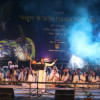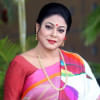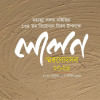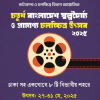We don't have enough women in the Bangladeshi music scene: Sohini Alam

Among many talented artistes being featured at the upcoming WOW festival, this will be the first time that British-Bangladeshi band "Khiyo" would be performing in the country.
Speaking about her experiences in music and the festival, The Daily Star had a chat with one of the co-founders, Sohini Alam.
As you are joining the WOW Bangladesh festival 2023, what can the Bangladeshi audiences look forward to?
This will be Khiyo's first ever show in Bangladesh, so we will be performing material from both our albums as well as a brand-new song from Leesa Gazi's upcoming film "Barir Naam Sahana",where we have directed the music.This means we will be performing our arrangements of some classic Bengali songs as well as original material.
How do you correlate your music with women and girls in Bangladesh from a feminist perspective? What will be your message to them?
I am part of an arts company - Komola Collective - that tells stories from the female perspective because female representation is important to me. My friend and Komola colleague Leesa Gazi is the one who writes the lyrics for all of Khiyo's original songs, so we have material that includes a tribute to the saree "Saree Bondona" and a song called "Ponkhi " which is about a bird who is told by a girl to see the world for her.
Besides the lyrical content of our songs, I feel that seeing women on stage and in bands is a powerful message to people. Khiyo will have me and our violin player Alice Barron.
In Bangladesh, we have very strong women, but not as many involved in the music scene as there should be although that is changing.
Why is your band named Khiyo?
Oliver Weeks and I formed Khiyo in 2007. We'd noticed that most Bangladeshi bands seemed to have English names, and we wanted a Bengali band name. Olly knows how to read and write basic Bengali. When we were trying to name the band, he pointed to the Khiyo in his dictionary, and I knew that the letter represented us well because it is an amalgamation of two sounds that make up a whole new letter with its own identity.

Khiyo's album "Bondona" came out recently; Can you share some themes from it that connect to women and girls?
"Bondona" differs from our first album in the sense that it has original songs as well as our interpretations of heritage music. As I mentioned earlier, some of the original songs are female-centric. For our song "Saree Bondona", we asked people to send in their saree videos and got a great response when we released the video last year. I was particularly struck by how the way we wear and view sarees is evolving and how much significance there is in those six yards of cloth. My toddler barely notices my clothes, but when I wear a saree, she plays in the folds with great exuberance.
As you were brought up in Britain, how have you been interested in Bangladeshi music, especially Nazrul songs and mystic songs?
I was born and raised in Britain by parents with strong cultural links to Bangladesh. My mother, Hoor-e-Jannat Alam, taught Bengali music in London, so I had been learning Bengali music for as long as I could remember. My aunts Jannat Ara and Ferdous Ara were already celebrated as Nazrul artistes in Bangladesh, and they took over my musical training. At that age, I didn't understand what a privilege it was to have a music school in our house, but I learned to appreciate it over time.

 For all latest news, follow The Daily Star's Google News channel.
For all latest news, follow The Daily Star's Google News channel. 









Comments